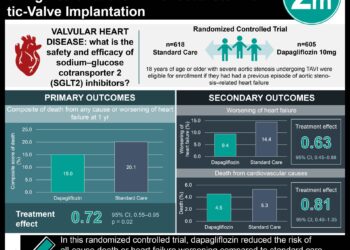In acute decompensated heart failure, treatment varies little by hemodynamic status
Image: PD
1. Rates of diuretic use, intubation, and hospital admission do not differ between hypertensive, normotensive, and hypotensive patients with acutely decompensated heart failure.
2. Of hypertensive acute decompensated heart failure (ADHF) patients in the emergency department (ED), less than half receive vasodilators, and approximately one third do not receive diuretics.
Evidence Rating Level: 2 (Good)
Study Rundown: It is important to differentiate patients with acutely decompensated heart failure (ADHF) based on their hemodynamic profile. In cases of ADHF, systolic blood pressures may indicate different underlying pathogenesis that require distinct management approaches. For example, cases of normotensive heart failure (HF) tend to represent a state of volume overload that has built up gradually over several days and is often responsive to diuretics alone. Hypertensive HF, in contrast, tends to occur more acutely as increased systemic vascular resistance redistributes fluid from the central to the pulmonary circulation; in these cases, early use of vasodilators have been proven beneficial. Although many ED triage risk assessments for ADHF now factor in systolic blood pressure (SBP) as a predictor of patients’ risk, current guidelines on acute heart failure do not modify therapy based on hemodynamic presentations.
This study aimed to examine how ADHF patients’ hemodynamic status was associated with therapeutic interventions in a nationwide sample. Its findings suggest that vasodilators are used more often in hypertensive cases, but otherwise management differed little between hypotensive, normotensive, and hypertensive patients. Many patients who may have benefitted from diuretics and/or vasodilators did not receive them. The retrospective nature of this study limits its clinical implications. The assertion that medications were under-utilized would be bolstered if the study included patient outcomes beyond their ED visit and demonstrated that those patients who didn’t receive diuretics and/or vasodilators actually had poor outcomes.
Click to read the study in American Journal of Emergency Medicine
Relevant Reading: Risk stratification for in-hospital mortality in acutely decompensated heart failure: classification and regression tree analysis
In-Depth [retrospective study]: This study aimed to assess the relative frequency of three distinct hemodynamic profiles in patients presenting to U.S. emergency departments (ED) with acute heart failure and the association of hemodynamic status with therapeutic interventions in the acute care environment. Using data from the National Hospital Ambulatory Medical Care Survey (2006–2010), a national probability sample survey, abstractors identified individuals presenting with acutely decompensated heart failure. Data collected included patient demographics; initial vital signs; and medication prescriptions, among other variables. Patients were classified into three hemodynamic profile groups based on their presenting systolic blood pressure (SBP): hypertensive [HTN] (SBP ≥ 160), normotensive [NT] (SBP 100–159) or hypotensive [HYPO] (SBP < 100). The primary outcome was the use of any diuretic or vasodilator. Secondary outcomes were procedures, admission rates, and mortality during the ED visit. Univariate and multivariate analyses were used to determine associations.
There were 921 sample cases in the database over the 6-year study period, 891 of which contained systolic blood pressure information and were included in analyses. Of all patients, 48% were normotensive, 32% were hypertensive and 21% were hypotensive. The rates of admission, endotracheal intubation, and ED mortality were similar across groups (P = 0.48; P = 0.40, P = 0.12, respectively). At least one cardiovascular medication was prescribed in the ED in 81% of hypertensive patients, 78% of normotensive patients, and 68% of hypotensive patients (P = 0.32). While prescription of loop diuretics was similar across groups, vasodilator use (mostly nitroglycerin) was greatest for hypertensive patients.
By Elizabeth Kersten and Andrew Bishara
More from this author: Outreach increases colorectal cancer screening among underserved; Clinical impression not reliable in identifying drug-seeking behavior; Industry influences on expert panels contribute to over-diagnosis; Undervaccination becoming more common, associated with increased patient admission rates; Overuse of colonoscopy widespread in the US; Silent myocardial infarctions more common than previously assumed
© 2013 2minutemedicine.com. All rights reserved. No works may be reproduced without expressed written consent from 2minutemedicine.com. Disclaimer: We present factual information directly from peer reviewed medical journals. No post should be construed as medical advice and is not intended as such by the authors, editors, staff or by 2minutemedicine.com. PLEASE SEE A HEALTHCARE PROVIDER IN YOUR AREA IF YOU SEEK MEDICAL ADVICE OF ANY SORT.







